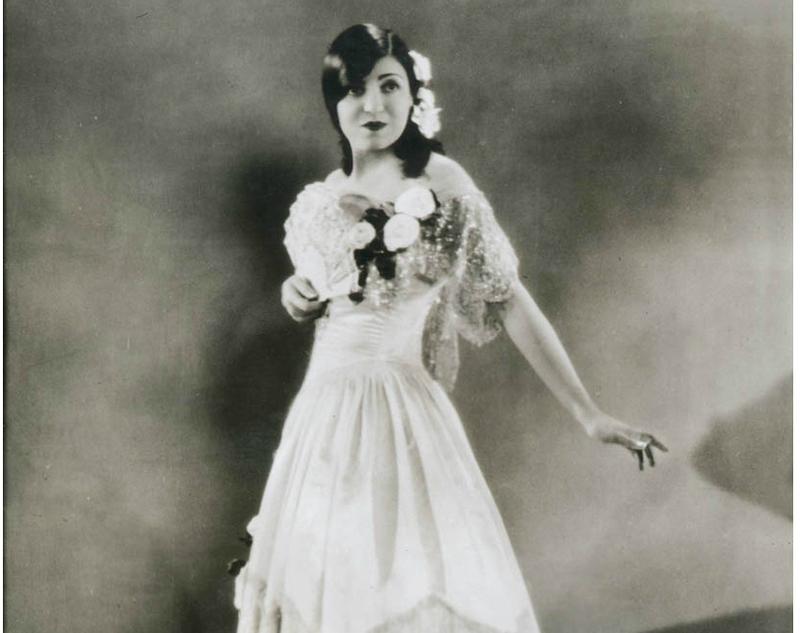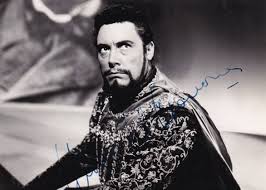|
SATURDEE OPRY LINKS 58:
Invigorating Edition
 
Rosa Ponselle
Mario del Monaco
Saturdee Opry Links Overture!
"Cosi fan Tutte," by Mozart.
https://www.youtube.com/watch?v=AEramVQ3_Xw
1.
Here's a punchy duet and exchange from Verdi's "Il Trovatore" to start
the proceedings. Rosa Ponselle and Riccardo Stracciare, from long ago. "Mira,
d'acerbe lagrime." You'd never know, from the upbeat tempo, that Leonora is
bartering with Count de Luna for the life of her beloved troubador,
Mauricio---promising herself to the Count (but swearing to make good on the
promise only as a "cold corpse.")
https://www.youtube.com/watch?v=QsRb7P82gO8
Translation: (Search for "Mira," and start there.)
http://www.murashev.com/opera/Il_trovatore_libretto_Italian_English
2.
To further invigorate the blood, here is Franco Corelli with a stirring aria
from "Norma," by Bellini. "Meco all' altar di Venere."
"Synopsis : Pollione tells his friend Flavio that Norma has violated her vows by
having his two children. He goes on to say that he is now in love with Adalgisa,
a holy virgin in the temple. He has dreamed about taking Adalgisa to Rome, but
it is bothering his conscience. In his dream, Norma has gotten his revenge upon
him.
https://www.youtube.com/watch?v=FU47DQa_iHQ
Translation:
https://en.wikipedia.org/wiki/Meco_all%27altar_di_Venere
3.
And now a touch of French elan, in the form of the jaunty, "Mes amis, écoutez
l'histoire," from Adolphe Adam's 1836 comic opera, "Le postillon de Lonjumeau."
Get ready for the D5 in the final verse, the highest commonly sung note for
tenors in opera. Assayed with aplomb by the great Nicolai Gedda. Sure to fire up
the adrenalin.
https://www.youtube.com/watch?v=WUBNwORdR9E
Basic plot:
The newly married postilion, or coachman, (Chapelou) and his wife (Madeleine),
an innkeeper, to ensure that their marriage will be a joyous one, decide to
consult a clairvoyant, who predicts that things will not go smoothly in their
marriage but does not state exactly what will occur nor when.
Translation:
https://en.wikipedia.org/wiki/Mes_amis,_%C3%A9coutez_l%27histoire
About the opera:
https://en.wikipedia.org/wiki/Le_postillon_de_Lonjumeau
4.
Continuing with arias and duets to stir the blood and invigorate the senses. .
.Here is Anna Netrebko. Hardly matters what she sings, really, but this is "Meine
Lippen Sie Kussen so Heiss" from the comic operetta, "Giudetta," by Franz Lehar.
"My Lips' Fiery Kiss." Anna gets a bit, shall we say, demonstrative. . .
https://www.youtube.com/watch?v=p_kaOYC_Fww
Translation:
http://www.lieder.net/lieder/get_text.html?TextId=27407
About the operetta:
https://en.wikipedia.org/wiki/Giuditta
5.
Attention, Snowflakes---this role is sung by an Italian in dark face make-up!
This might get your blood stirring, but for the wrong reasons. Here is the great
Mario del Monaco in a blood-curdling film clip of Verdi's "Otello" in 1954. "The
Man Who Could Not Sing Quietly" does an admirable job of doing so here, as well
as living up to his tremendous power.
https://www.youtube.com/watch?v=fBDBAsAybCU
Synopsis: Otello has killed his wife because Iago led him to believe that she
betrayed him with another man. He discovers that Iago lied and that Desdemona
was innocent. In anguish, he grieves over her death and eventually kills
himself.
Translation: (scroll down)
http://www.mariolanzatenor.com/otello-monologue-and-finale.html
Hard to choose between the two Marios: Del Monaco and Lanza. . .
Here is Lanza's rendition, from his final film, "For the First Time," recorded
in 1958.
https://www.youtube.com/watch?v=_FwNvoNM86A
6.
Talk about getting the blood and hormones all a-twit. . .You have to understand
that poor Tristan and Isolde have been poisoned with a love potion, though even
that does not explain the, oh, indelicacy, of their declaration of mutual
affection. Wagner, though you might not know this, was obsessed with. .
.love---and not just self-love. You wouldn't think he'd have room for adoring
anything other than himself, but he did! He adored love itself! All his operas
concern love, and redemption through love. You can spend a career (many have)
analyzing the psychological complexities at issue in Wagner's telling of this
story (chiefly relating to Shopenhauer, for those scholars among you), the
alleged sexual implications in the music, the entangled psychology of the "Liebestod"
("Love-death") theme alone---which is all fine. Or you can let it wash over you,
and feel things intuitively. Here is an excerpt from the previously posted
Guardian article, to explain further:
"Tristan und Isolde marked a new beginning for Wagner – and indeed for opera.
Written in the 1850s, at the same time as he was beginning the Ring, he was
moving away from plot-driven romantic operas to meditations on the nature of
existence itself. Under the influence of the philosopher Arthur Schopenhauer
(who taught him that man’s life on Earth was dominated by unfulfilled longing)
and sexual yearning for the married Mathilde Wesendonck (which taught him much
the same thing), he had gone all metaphysical, and his work would never be the
same again.“Life and death, the whole import and existence of the outer world,
here hang on nothing but the inner movements of the soul,” wrote Wagner. Barry
Millington, in The Sorcerer of Bayreuth, marvels at the way he takes a simple
love affair – the standard fare of opera for centuries – and turns it into a
philosophical disquisition. “Wagner’s opera transcends its scenario of a
conventional love story to offer a profound meditation on the nature of the
material world, on the metaphysics of subjectivity and on the mysteries of human
existence itself,” writes Millington.
And here is the love duet from Act 2, in which the poor lovers are essentially
out of their minds with ardor (not such a bad thing, really!). "Liebesnacht"
("night of love"), with the great heldentenor, Siegfried Jerusalem, and soprano
Waltraud Meier. I suggest beginning at about the 17:10 mark. English subtitles.
(No, I don't know the significance of all the empty armor, amid the amor. It's
Bayreuth, Jake.)
https://www.youtube.com/watch?v=lQNcTYVlcEg
7.
Nothing quite stirs the old corpuscles like nine high C's, I'd say. Nice of
Donizetti to have supplied an aria to that effect---"Ah, mes amis," from
"Daughter of the Regiment." As you might expect, it's a declaration of love.
Here is Juan Diego Florez, doing the antic honors.
Synopsis: After Tonio has been made a member of the French Grenadiers, he
approaches some of the members and explains that he has joined the regiment
because he loves the regiment's "daughter" Marie. In the cabaletta "Pour mon âme",
after asking the members of the regiment to allow him to marry Marie and
receiving an affirmative answer, Tonio sings his joy at finally being united
with his one love. He promises to take care of her and protect her forever.
https://www.youtube.com/watch?v=WD1Cq2T5veI
Translation:
http://www.aria-database.com/search.php?individualAria=783
AND, if you want to see what it looks like on stage (with vocals not quite
synced up):
https://www.youtube.com/watch?v=3aS6M8j3pvQ
8.
Making a SOL debut, here is rendition of the song, "Il Mio Primo Amore Sei Tu."
Beniamino Gigli, from 1936, with the beloved, love-drenched, declaration of, you
guessed it, love, by one Pietro Labriola.)
https://www.youtube.com/watch?v=XjVu4vzwY_g
Translation:
http://lyricstranslate.com/en/il-primo-amore-sei-tu-first-love-thats-you.html
9.:
The final scene
from Mozart's "Don Giovanni." Women, in particular, should find this
rather stimulating, as a womanizing cad gets his due---by being dragged to hell by a
statue-come-to-life. With English subtitles.
https://www.youtube.com/watch?v=hY_bQpmEBc0
Translation: (search for "statue.")
http://www.murashev.com/opera/Don_Giovanni_libretto_Italian_English
FINAL BOW:
Here is the
tremendous voice of Franco Corelli with the anguished, "Addio a la Mamma," from "Cavaleria
Rusticana," by Mascagni.
https://www.youtube.com/watch?v=lW4OQZ215zM
Synopsis : Turiddu has been challenged to a duel by Alfio. He is drunk and does
not believe that he will live through the duel. He tells his mother that he is
going out and asks her to take care of his beloved Santuzza if he doesn't come
back.
Translation:
http://www.aria-database.com/translations/cavrusti06_mamma.txt
Saturdee Opry Links Encore!
Our times might be very dark, but there is always "O Sole Mio." Returning to Franco Corelli.
https://www.youtube.com/watch?v=AZZMP_KnAyU
Translation:
https://en.wikipedia.org/wiki/%E2%80%99O_sole_mio
Back to Opera Links
Back to Home Page
|



